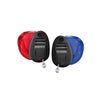 Listening Lab Malaysia has Resound hearing aids for sale.
Listening Lab Malaysia has Resound hearing aids for sale.

Hearing loss or impairment in both ears is called Bilateral Hearing Loss. Like hearing loss with one ear, bilateral hearing loss can have various degrees: mild, moderate, severe, or profound. This impairment may be caused by several factors in the outer, middle, or inner ear or a combination of these areas.
Bilateral hearing loss can be - symmetrical or asymmetrical. It is symmetrical if the hearing loss is about the same in both ears. When one ear hears better than the other, it is asymmetrical. But in both cases, hearing loss is present.
Relevant reading: Binaural Hearing: Why We’re Made with Two Ears Instead of One
What are the causes of bilateral hearing loss?
Bilateral hearing loss can be due to many factors. The most common causes are
- Age
- Noise exposure
- Heredity (genetic)
- Medication mostly leads to sensorineural hearing loss.
You can have bilateral hearing loss if both of your ears' capability to manipulate sound into the inner ear is blocked or reduced. This is called conductive hearing loss.
Bilateral hearing loss is conductive and sensorineural, called mixed hearing loss.
Treatments of bilateral hearing loss
Some cases of bilateral hearing loss can be treated with surgery. Other types of bilateral hearing loss are best treated with hearing aids. Whether you need one or two hearing aids depends on each ear's hearing loss.
In some cases of bilateral hearing loss, both surgery and the use of hearing aids are recommended. Single-sided deafness is also possible if you have hearing loss in one ear. There are also other causes of hearing loss and how they can be treated. You can read more about them.
Hearing aids and tinnitus
Tinnitus often accompanies hearing loss. Many hearing aid manufacturers suggest hearing aids with functions and program options that help relieve tinnitus discomfort. Make sure you take a hearing test before buying hearing aids. Wrong or inaccurate hearing test results could lead to an inaccurate hearing aid fitting resulting in over or under amplification, which can harm your hearing levels.
Hearing aids for children
Hearing aids typically have product ranges for children with hearing loss, including babies, infants, and toddlers. Read more about hearing aids for children.
The most suitable hearing aids should compensate for your personal hearing loss. You should always select hearing aids that fit your conditions. Hearing care professionals should always advise you when selecting your hearing aids.
Recommendation
Hearing aids should provide hearing and enhance their perception of speech and other sounds. Hearing aids can, however, not restore hearing back to normal hearing. If hearing aids are not enough, ask for a recommendation on cochlear implants.
You should contact your family doctor or a hearing health care professional if you have bilateral hearing loss. The Listening Lab Malaysia also offers treatment options for patients of any age group who suffer from hearing loss. You may also contact us for enquiry on hearing loss or hearing aids.











